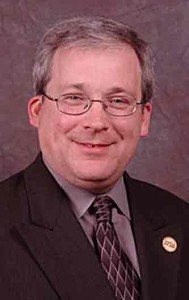Bluegrass Beacon: Harvey’s message would lead to a ‘Good Day’ for America
By JIM WATERS
Bluegrass Institute for Public Policy Solutions
Editor’s note: Jim Waters is on vacation this week. The following column originally was published in 2009.
Thursday, Dec. 29, 2011, 11:55 a.m. – I spent years as a broadcast news anchor and these days frequently find me in a studio doing an interview or recording a commentary. So I couldn’t resist turning the pages of a new book about the late Paul Harvey.
I frequently mention the founding fathers leading the War of Independence against King George. But Harvey was a founding father in his own right – one of radio’s founding fathers. But he would have fit right in with Jefferson and Franklin, despite arriving on the scene years later.
Like them, he faced a lot of adversity, but hung tough.
At age 3, robbers killed Harvey’s father, a police officer. Harvey, or Paul Aurandt as he was originally named, grew up in the Great Depression. His unique voice became one of patriotic reason on America’s airwaves.
“I was never one who sought to make the small man tall by cutting off the legs of a giant,” he once said. “I wanted to drag no man down to my size. Only to preserve a way of life which might make it possible for me, one day, to elevate myself until I at least partly matched his size.”
How different that rings from what we hear today from those who want to take from those who work hard to prosper and give it to those who think the world owes them.
They should read Paul Batura’s “Good Day! The Paul Harvey Story.” The message comes through loud and clear: You won’t get ahead by pulling another man down.
Or to put it in a contemporary context: “Mr. President, your statement during your presidential campaign to Joe the Plumber that ‘When you spread the wealth around, it’s good for everybody’ is not good for anybody.”
You’re not telling “The rest of the story.”
America and its capitalist system work because it hinges on a strong belief in equality – not equality of wealth but of opportunity.
Harvey learned this at an early age. While growing up in Tulsa during the Great Depression, he witnessed a great chasm between those like himself, who came from struggling families, and those who, because of the presence of big oil, became insulated from many of the day’s economic woes.
Harvey tells about wearing one pair of trousers, which eventually became worn out and worn through.
“Embarrassed, he walked sideways down Main Street and while doing so, spotted a chauffeur-driven automobile transporting one of the oil barons of the city,” Batura wrote. “Usually even-keeled, his temper flared. For the first time in his life, he began to feel sorry for himself – and jealous of a man he had never met.”
His mother took him downtown and used $11.95 she had set aside to pay taxes to buy him a new pair.
Harvey later told his former teacher Miss Harp of Longfellow Elementary School about his anger toward an oil baron he’d never met.
Miss Harp’s response changed Harvey’s life: “Paul, never feel resentment in your heart for those who have more than you. Just do all you can as long as you live to preserve this last wonderful land in which any man willing to stay on his toes can reach for the stars.”
Harvey’s voice boomed across America’s airwaves for more than four decades. Actor and comedian Danny Thomas described it as a voice in which “you can almost hear the amber waves of grain.”
That voice – unmatched in texture – belonged to a man who added many chapters to the American story begun by our founders.
And he did it without pulling anyone else down.
— Jim Waters is vice president of communications for the Bluegrass Institute, Kentucky’s free-market think tank. Reach him at jwaters@freedomkentucky.com. Read previously published columns at www.freedomkentucky.org/bluegrassbeacon.
-30-







